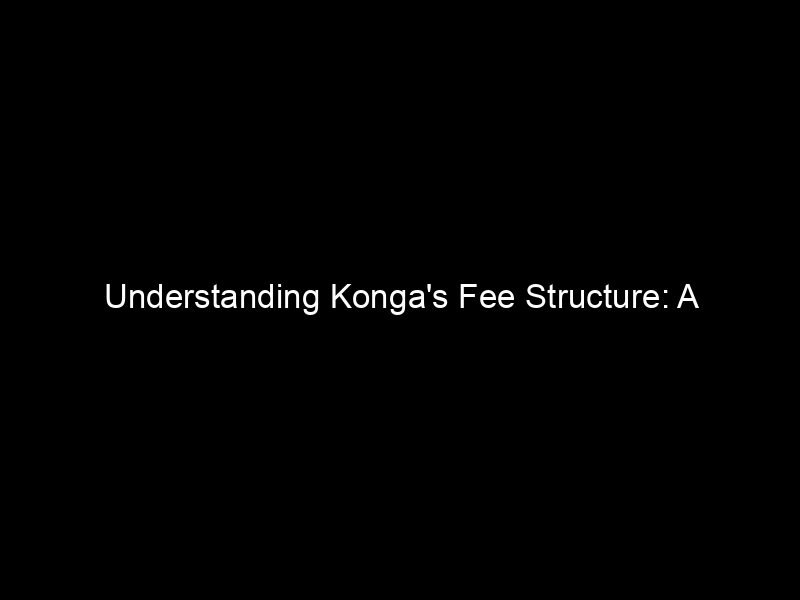As an expert with a background in Nigeria’s e-commerce business, I’m here to provide an insightful and detailed guide on Konga’s fee structure. Konga, a leading e-commerce platform in Nigeria, has revolutionized the way businesses and consumers engage in online shopping. Understanding their fee structure is crucial for both sellers and buyers who want to make the most out of their online transactions.
Delving into Konga’s Fee Details
Konga’s fee structure is designed to cater to a broad range of sellers, from small-scale entrepreneurs to large enterprises. The fees are typically a combination of listing fees, commission rates, and sometimes, shipping fees, depending on the product category and the seller’s subscription plan.
Listing Fees
Konga allows sellers to list their products on its platform. The listing fee varies based on the product category and the seller’s subscription plan. For instance, electronics might have a different listing fee compared to fashion items. This fee is usually nominal and is structured to encourage a wide variety of product listings on the platform.
Commission Rates
The commission rate is a significant part of Konga’s fee structure. This rate is a percentage of the sale price and varies depending on the product category. For example, electronic gadgets may attract a different commission rate compared to home appliances or clothing. It’s essential for sellers to understand these rates as they directly impact the pricing and profitability of their products.
Shipping Fees
Shipping fees are another aspect of Konga’s fee structure. These fees depend on the size and weight of the product, the shipping destination, and the delivery speed chosen by the buyer. Sellers can either incorporate the shipping fee into their product price or charge it separately. Konga also offers partnerships with logistics companies to facilitate easier and more affordable shipping options for sellers.
Advanced Insights on Fee Optimization
To optimize costs on Konga, sellers must understand the nuances of the fee structure. This includes selecting the right product categories, adjusting pricing strategies according to commission rates, and leveraging Konga’s shipping partnerships for cost-effective logistics.
Product Category Selection
Selecting the right product category is crucial. Some categories might have higher commission rates but also bring in more customers. Sellers need to balance between the commission cost and the potential market size.
Pricing Strategy
Pricing strategy plays a pivotal role in managing Konga’s fees. Understanding the commission rates for each category enables sellers to price their products competitively while ensuring profitability. It’s a delicate balance between attracting customers with competitive prices and covering the costs of commissions and other fees.
Utilizing Shipping Partnerships
Leveraging Konga’s shipping partnerships can significantly reduce logistics costs. These partnerships often offer discounted rates, which can be a game-changer for sellers in terms of cost savings and delivery efficiency.
Frequently Asked Questions (FAQs)
What is the average commission rate on Konga?
The average commission rate on Konga varies by product category. Generally, it ranges from 5% to 15%, but it’s essential to check the specific rate for your product category.
Are there any hidden fees on Konga?
Konga prides itself on transparency. All fees, including listing and commission rates, are clearly outlined. However, sellers should be aware of potential additional costs like shipping and handling.
How does Konga’s fee structure compare to other e-commerce platforms in Nigeria?
Konga’s fee structure is competitive and is designed to encourage a wide range of sellers to participate. It’s always wise to compare the fees with other platforms to find the best fit for your business model.
Can I negotiate the fees with Konga?
Typically, the fees are standardized and not open to negotiation. However, Konga sometimes offers promotional discounts or special terms for high-volume sellers or during certain campaigns.
Is it more cost-effective to sell on Konga or to have my own e-commerce website?
This depends on various factors like your sales volume, product category, and marketing strategy. Selling on Konga provides access to a broad customer base and integrated logistics support, which can be more cost-effective for many sellers.
In conclusion, understanding Konga’s fee structure is vital for anyone engaged in Nigeria’s burgeoning e-commerce market. By mastering these details, sellers can optimize their sales strategy, ensuring profitability while providing competitive prices to their customers. As the e-commerce landscape evolves, staying informed and adaptable to platforms like Konga will be key to success in the digital marketplace.
